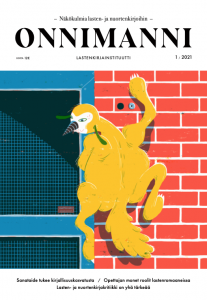 Primary school teacher Kia Raevaara has studied children’s books from the past ten years set in a school milieu and found that they feature teachers working under increasing pressure. Teachers are often depicted as humorously exaggerated caricatures, yet most books portray recognisable everyday life at school and teachers who are genuinely dedicated to their work.
Primary school teacher Kia Raevaara has studied children’s books from the past ten years set in a school milieu and found that they feature teachers working under increasing pressure. Teachers are often depicted as humorously exaggerated caricatures, yet most books portray recognisable everyday life at school and teachers who are genuinely dedicated to their work.
Children’s literature criticism has decreased in Finnish newspapers and cultural magazines throughout the 2000s. Outi Hytönen talks to four editors in chief, who share an interest in literature for children and young adults, but lack skilled writers and criticism angled towards their magazine’s readership. According to them, professional overviews guiding readers through the flood of new children’s books, serve adult readers better than reviews of single titles.
Onnimanni’s first issue this year highlights literary arts education. A Finnish law on teaching the arts was passed in the early 1990s, which elevated literary arts as equal to visual and performance arts. Literary arts is taught over a broad age range from babies to teenagers.
Päivi Heikkilä-Halttunen interviews four literary arts pedagogues, who wish that kindergartens, schools and libraries would make more frequent use of literary arts education. Books for children and young adults are used as material and a source of inspiration for creative exercises within literary arts education. Literary arts workshops arranged in schools show that children with little previous interest in reading gain an increased interest in books and writing as a result of these activities. Books that cross genre boundaries (e.g. novels in verse and experimental poetry) are especially inspiring when teaching young people to write texts of their own.
Elina Suomalainen takes a closer look at a private kindergarten in Turku, which focuses on the literary arts by using rhymes and books in various ways. Everyday exercises are used to support toddlers to boost their self-image and develop their speaking skills. In the Lukutikku-column addressed to teachers, Juli-Anna Aerila and Merja Kauppinen demonstrate how literary arts skills in early childhood education strengthen children’s abilities to cooperate and interact. Literary arts pedagogue and writer Emma Puikkonen asserts in her Kompassi-column that literary arts are not only relevant for children dreaming of a literary career. Everyone growing up in our modern-day information society can benefit from developing their literary arts skills.
Tuula Korolainen highlights her long-lasting friendship with writer Sinikka Nopola (1953–2021) in her obituary, which celebrates Nopola’s talent for writing dialogue. Along books for an adult readership, Nopola wrote together with her sister Tiina the popular children’s book series about Hayflower and Quiltshoe, and Ricky Rapper.
Translation: Maria Lassén-Seger
